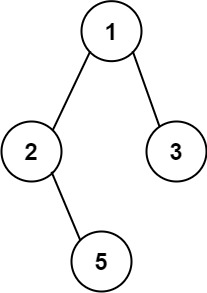257.Binary Tree Paths
Given the root of a binary tree, return all root-to-leaf paths in any order.
A leaf is a node with no children.
Example 1:

1
2
| Input: root = [1,2,3,null,5]
Output: ["1->2->5","1->3"]
|
Example 2:
1
2
| Input: root = [1]
Output: ["1"]
|
深度优先遍历:
时间复杂度:O(n2)
空间复杂度:O(n2)
1
2
3
4
5
6
7
8
9
10
11
12
13
14
15
16
17
18
19
20
21
| class Solution {
public:
vector<string> ret;
void next(TreeNode* root, string path) {
if (root != nullptr) {
path += to_string(root->val);
if (root->left != nullptr || root->right != nullptr) {
path += "->";
next(root->left, path);
next(root->right, path);
}
else {
ret.push_back(path);
}
}
}
vector<string> binaryTreePaths(TreeNode* root) {
next(root,"");
return ret;
}
};
|
广度优先遍历:
时间复杂度:O(n2)
空间复杂度:O(n2)
1
2
3
4
5
6
7
8
9
10
11
12
13
14
15
16
17
18
19
20
21
22
23
24
25
26
27
28
29
30
31
32
33
34
35
36
| class Solution {
public:
vector<string> binaryTreePaths(TreeNode* root) {
vector<string> paths;
if (root == nullptr) {
return paths;
}
queue<TreeNode*> node_queue;
queue<string> path_queue;
node_queue.push(root);
path_queue.push(to_string(root->val));
while (!node_queue.empty()) {
TreeNode* node = node_queue.front();
string path = path_queue.front();
node_queue.pop();
path_queue.pop();
if (node->left == nullptr && node->right == nullptr) {
paths.push_back(path);
} else {
if (node->left != nullptr) {
node_queue.push(node->left);
path_queue.push(path + "->" + to_string(node->left->val));
}
if (node->right != nullptr) {
node_queue.push(node->right);
path_queue.push(path + "->" + to_string(node->right->val));
}
}
}
return paths;
}
};
|
